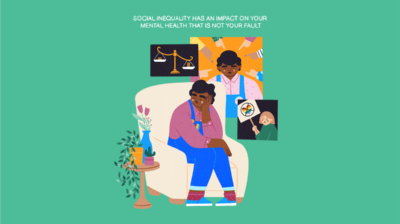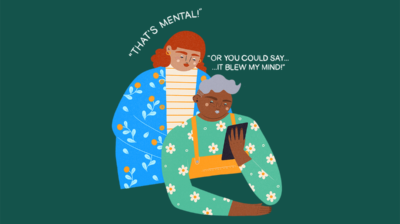How to cope when a parent has a mental health problem
It can be difficult when a parent is dealing with a mental health problem

When a parent is struggling with a mental health problem, it can be hard to know what to do or how to handle your feelings about it. Although you may want to be there to support your parent, it’s also important that you are looking after your own mental health as well.
Understanding your emotions when a parent has a mental health problem
Trying to come to terms with the fact that your parent is struggling can be hard, and it’s normal to feel a wide range of emotions when someone in your life has a mental health problem. You may be feeling:
- Lonely
- Isolated
- Angry
- Guilty
- Sad
- Scared
- Frustrated
- Anxious
Some young people feel lonely and isolated because they don’t know how or if to share what’s going on with their friends, or they might avoid inviting people over or leaving the house if they’re worried about their parent. Feeling angry or frustrated is understandable because living with a parent who has a mental illness may not be easy. It’s also normal to feel scared or anxious about what might happen, and it’s okay if you find the experience upsetting.
Talk to someone
The most important thing you can do is talk to someone about how you’re feeling. If you’re not comfortable discussing it with a family member or friend, look into counselling (you would need permission from your parents if you are under 18) or get in touch with a helpline like Childline or Samaritans (details at the end of this page).
Understanding a parent’s mental health problem
Knowing what to expect and why your parent feels the way they do can be helpful when trying to cope with the situation.
Learn about their illness
If your parent has been diagnosed with a mental illness, take time to learn more about it and what they’re going through. Look for information from reliable websites, like the HSE website, or look at the mental health section of SpunOut.ie. Ask them to explain to you what their condition is. Knowing more about it can help you to understand it.
Remember this is not your fault
It’s important to know that your parent’s mental health problems have nothing to do with you – it is not your fault. It can be easy to fall into a sense of guilt sometimes and wonder if there’s anything you are doing wrong that has made them feel this way. A mental illness is a health problem, in the same way that a heart condition is a health problem. Whatever they are dealing with, you are not the cause of their mental health problems.
It’s not your responsibility to make it better
As much as you may want to, you are not responsible for making your parent better. Although your love and support can help them on their journey to recovery, it is not your job to make them better. This is something they can only do themselves, with the help of doctors and mental health professionals.
Talk to them about it
You may be worried about approaching your parent to have a conversation about their problems, but talking about it can be a positive thing for both of you. It will help your parent to know that you are trying to understand more about their condition, and it gives you an opportunity to ask things that have been on your mind. You can talk about what it’s like for them, share how it makes you feel, and discuss things both of you could try to make things better.
If you can, try to have this conversation when things are going well. Avoid trying to talk about it if one or both of you is upset or angry. If the conversation doesn’t go as you had hoped, try not to be disheartened. If you want, you can try again after a while.
If you feel like talking to them isn’t an option, that doesn’t mean you have to keep everything to yourself. Contact a listening service (information below) to talk about how you feel, or find out about counselling options in your area.
Take care of yourself
This is an incredibly difficult situation for you, and it’s really important that you look after yourself. This means making time to do things you enjoy, finding ways to relax and de-stress, and talking to people about what’s going on.
Finding support for yourself when a parent has a mental health problem
Dealing with your parent’s situation can have an impact on your own mental health. Making sure you have the support you need will not only help you cope, it will help your parent to know that there are people there to help you.
Counselling
Seeing a counsellor gives you the space to talk openly about what’s going on in your life and how you feel about it. The counsellor won’t tell you what to do, but they will listen to you and help you to develop healthy coping mechanisms to deal with your emotions.
Having someone who is not a family member or friend to talk to about your parent’s problem can make it easier to work through your feelings.
- Jigsaw is a youth mental health organisation offering counselling to young people age 12-25. They have 13 centres in communities across Ireland.
If you are under 18, you will need parental consent to attend counselling.
Support services
There are a number of support services with phone support, text messaging support, and online chat support, who are available day and night to talk about whatever is going on for you.
SpunOut.ie
If you need someone to talk to right now, SpunOut.ie’s text message support service is available 24 hours a day, 7 days a week. We provide in-the-moment anonymous support and problem solving when you need it most.
- Text SPUNOUT to 086 1800 280 to begin. Standard SMS rates may apply.
Childline
Childline offer a free phone service and a text and instant messaging service. You can contact them any time of the day or night by:
- Calling 1800 66 66 66,
- Sending a text to 50101
- Using their live messaging system on their website.
Teenline
Teenline is a non-directive, non-judgemental and confidential helpline for teenagers age 13-19. They offer a freephone listening service. You can contact them by:
- Calling 1800 83 36 34 (8-11pm Monday to Friday)
Samaritans
Samaritans offer free, 24/7 support via phone, text message, and email. You can contact them by:
- Calling 116 123
- Emailing [email protected]
Traveller Counselling Service
If you are a young Traveller and would like to speak to a counsellor who specifically works with the Travelling Community, the Traveller Counselling Service can support you. The service works from a culturally inclusive framework which respects Traveller culture, identity, values and norms. They provide Traveller culture centred counselling and psychotherapy. They offer counselling both in person and online.
- Landline: 01 868 5761
- Mobile: 086 308 1476
- Email: [email protected]
travellercounselling.ieTraveller Counselling Service – New Cabra RoadNew Cabra Road
If you need support, reach out and ask for it. There is no problem too big or too small. It’s good that you want to be there for your parent, but remember to look after yourself too.
For advice and support from young people on living with a parent who has a mental health difficulty, visit the WITH project.






